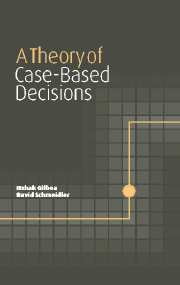3 - Axiomatic derivation
Published online by Cambridge University Press: 22 September 2009
Summary
Highlights
We devote this chapter to the axiomatization of W-maximization. In this section we describe the model and our key assumptions. Formal discussion is presented in the following section.
The decision maker is asked to rank acts in a set A by a binary preference relation, based on her memory M. Further, we assume that the decision maker has a well defined preference relation on A not only for the actual memory M, but also for other, hypothetical memories that can be generated from M by replication of cases in it. While the representation (◊) in subsection 6.1 allows repetitions in memory, we now require that preferences be defined for any such vector of repetitions.
In many situations it is not hard to imagine cases appearing in memory repeatedly. For instance, in the recommendation letters example one may imagine several letters relating practically identical stories about a candidate. Cases that are available to a physician in treating a specific patient will often be identical to the best of the physician's knowledge. Moreover, cases that are known to be different may still be considered equivalent as far as the present decision is concerned. Patterns in the history of the weather or of the stock market can also be imagined to have occurred in history more or less times than they actually have.
Yet, the assumption that cases can be repeated is restrictive. Consider the example of war in Bosnia again.
- Type
- Chapter
- Information
- A Theory of Case-Based Decisions , pp. 62 - 90Publisher: Cambridge University PressPrint publication year: 2001



